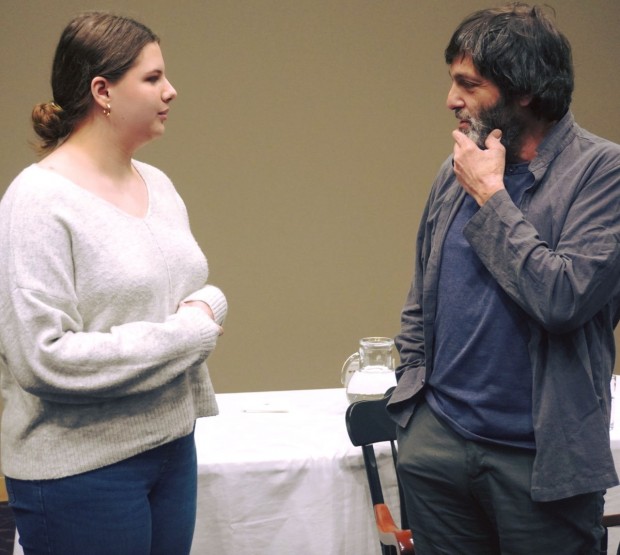Duke Behavioral Economics Professor Dan Ariely Visits Kinkaid

“I’m going to start my talk today by telling you why I have half a beard."
An auditorium of Kinkaid students fell silent as a man in a grey shirt and pants, with a spark in his eyes and a spring in his step, walked on stage.
That man was Dan Ariely, James B. Duke Professor of psychology and behavioral economics at Duke University. Prof. Ariely, known for his love of studying irrationality, was named this year's Damon Wells Fellow and invited to speak at Kinkaid. In his 45-minute address, he would significantly change the students’ views on human nature, shedding light on what forces influence our behavior and why we often fail to act in our best interest.
Prof. Ariely explained to the enraptured high schoolers that his half-beard resulted from an accident at age 17, which left him with third-degree burns. He initially shaved the one side of his face that could grow hair, an unintentional move to hide his “asymmetry,” but after a hike with a friend, decided to wear his half-beard with pride. Even if it got him an odd look or two, he was determined to be himself.
His work, he said, is dedicated to moves of irrationality like this. He founded the Center for Advanced Hindsight, an organization that conducts behavioral science research in the US and abroad. Through anecdotes, Prof. Ariely explained a law of human nature that he felt students needed to know.
“Humanity is like a rocket; for all of our operations, there is friction and fuel,” he said.
The friction and fuel principle, he said, was simply that humans need something to propel us into action, and we need to be on the path of least resistance as we take action.
“How many of you have sent a text while driving even though you knew it was wrong?” he said. "What about eating too many sweets on a diet? What about not washing your hands after using the restroom? Don’t be ashamed. It’s neither good nor bad, though maybe unsanitary. It’s our nature. It’s a story of friction and fuel.”
Ariely shared the story of a pharmaceutical company that wanted to encourage customers to switch to cost-effective generic drugs. The company sent letters to its customers, encouraging them to switch. Doing so would save the customers money, but it required them to return a signed form.
"That’s a lot of friction,” he said. “In today’s time, people don’t like to fill things out, much less mail them back. The truth of it is people don’t love paying more for branded drugs. They just really prefer doing nothing to doing something.”
Even when offered free prescriptions for six months, people didn’t switch. If money wouldn’t change the equation, what would? The solution was ultimately a “forced choice.” The threat of stopping people’s prescriptions was the only thing that made them switch.
The lesson? Removing friction or forcing the hand of the user are two tactics people should use when designing systems.
Prof. Ariely described another series of experiments he conducted in the Kibera slums in Kenya. To encourage saving among the population (who live on a hand-to-mouth basis), his team tried savings matches; simple reminders (including guilt-trip-inducing texts from their kids); and even loss-aversion tactics (making them feel like they were losing if they didn’t save, even though they weren’t). The texts from their kids worked well, as did the loss-aversion tactics. However, the incentive that worked best came from an unexpected source. Those who saved the most received a physical coin. It wasn’t of any financial value, but it showed others that the bearer of the coin was responsible.
In summation, he said to enthusiastic applause, “It is impossible for me to tell you to be rational, but I can encourage you to understand your irrationality. Do that, and you’ll unlock great knowledge.”
Want more buzz like this? Sign up for our Morning Buzz emails.
To leave a comment, please log in or create an account with The Buzz Magazines, Disqus, Facebook, or Twitter. Or you may post as a guest.



